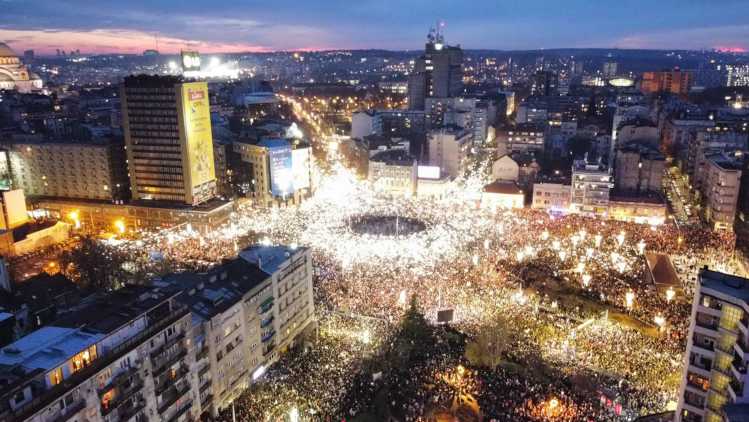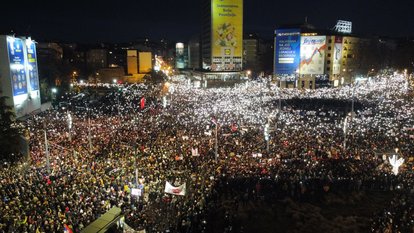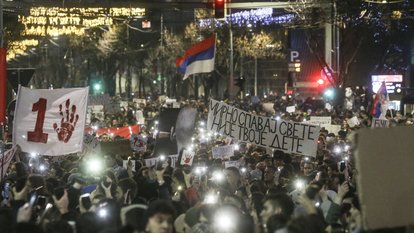Serbia
Student protests reconcile generations

Proteste im Zentrum Belgrads.
© CRTAIn Serbia, tens of thousands of people are once again taking to the streets in protest against the autocratic regime of President Aleksandar Vučić, this time the protest is being led by students. Our colleague Edita Barać-Savić supports her daughter's generation in the protests and sees even more clearly what her own generation failed to do.
"Generation Z" believes in beauty, love, laughter, honesty and honor. Their voices are a song of freedom that the Serbian "Generation X" - their parents - could not sing loud enough. We are witnessing an intergenerational encounter in the mirror. All parents can do now is to support their children and show them that they understand and believe in their dreams. Their journey together is not easy, but it is paved with sincere, untainted and good intentions. These children are not the future, they are the present.
The sky has fallen on our heads
In July 2024, representatives of the Serbian government officially opened the main building of the Novi Sad train station after three years of renovation by Chinese state construction companies and Serbian subcontractors with close ties to the government. Just three months later, on 1 November, the massive canopy of the building collapsed, burying fifteen people, including two children, beneath it.
It was only after massive public pressure that the first resignations of officials and arrests of individual functionaries were made. However, the public is dissatisfied with the speed and lack of transparency in communication. At the end of November, students in Belgrade organize a memorial service for the victims of the tragedy in Novi Sad. At exactly 11:52 a.m., the time of the collapse, they block the street in front of their faculty together with their professors and remain silent for fifteen minutes - one minute for each victim. While they were doing this, they were attacked by unknown thugs.
Following the incident, the protests quickly spread to other faculties and universities throughout Serbia. Students are currently blockading the rectorate of the University of Belgrade and all fifty faculties of the country's largest university. They are demanding that those responsible be held accountable and that all documents relating to the canopy collapse be published. They are also demanding more money for education. Meanwhile, the protests, which have spread to other major cities such as Novi Sad, Niš and Kragujevac, are also receiving support from high school students, farmers and, more importantly, the general population.
Serbia's autocratic President Aleksandar Vučić recently declared that he had “instructed” the government to meet all the students' demands and ordered the release of all those arrested during the protests. However, the children of the generation that visibly lost the democracy they fought for after Slobodan Milošević's overthrow in 2000 are not turning to the president at all. The president does not have the authority to release people or promise more money for education, say the students, thereby denying legitimacy to the almost omnipotent Aleksandar Vučić. The students are making it clear that they are striving for nothing less than a change of system: away from the impotence of an autocratic regime and towards a system of separation of powers with democratically legitimized institutions, as actually provided for in the Serbian constitution.


The generation that has given up
The students' protests arouse deep-seated emotions in Serbia, especially among their parents' generation. It is hard not to feel bitterness and sadness for the failure to leave our children a better life and a freer country. As parents watch their children take to the streets with passion and determination to change what they themselves have failed to achieve, an emotional merry-go-round begins, mixing pride with sadness.
As a parent, one senses that their struggle is honorable, sincere and free of compromise. At the same time, one hears from the pro-government media that these are “not real students”, but mercenaries paid from abroad who, as a minority, are terrorizing the majority. What the government underestimates in its statements is the effect of its words: every new slander only creates more determination to continue the protests and maintain the blockades. In essence, the students are demanding something elementary: the right to live freely in a democratic country in which membership of the ruling party is not a condition for employment, not only in the public sector.
And the parents? They carry the burden of a generation that remained silent, waited, suffered and ultimately gave up during the decline of Serbian democracy. Too often what should have been said was not said, and too often irrational fears were allowed to overwhelm rational dreams. The bitterness and sadness over the burden we have left our children culminates in today's young people listening to the songs of yesteryear. By Đorđe Balašević, whose songs shaped the 1990s, which were a watershed for Serbian society in every respect, and who, like their parents, was born in a country that the children never got to know.
How loud can silence be?
On December 22, exactly one month after the first blockade by the students of the Faculty of Film Arts, a massive protest takes place on “Slavija”, one of Belgrade's central traffic circles. Streams of students from all faculties flow from all directions - and with them and standing by their side are their parents, grandparents, aunts and uncles, actors, athletes and farmers. A cross-section of Serbian citizens.
The assembly begins with a fifteen-minute silence. You could hear a pin drop. As always, it could be assumed in advance that the protests would hardly be covered by the media or that their number of participants would be downplayed. The Ministry of the Interior declared in the evening that a maximum of 29,000 citizens had been on site. Based on the available image and video material, the “Archive for Public Assemblies”, a trustworthy non-governmental organization, estimates the number of participants at around one hundred thousand people.
But ultimately, it is not the numbers that matter, but what hundreds of thousands of citizens were able to feel during this tremendous silence. Each and every one of those present will say that this indescribable and priceless feeling cannot be expressed in numbers - only in emotions.
Video – the loudest silence:
Edita Barać-Savić is Project Manager for Civil Society Cooperation at the Friedrich Naumann Foundation for Freedom in the Western Balkans office based in Belgrade.
